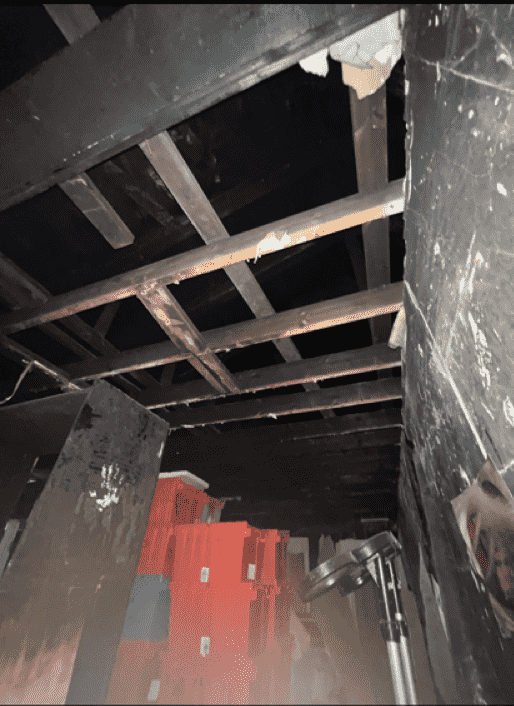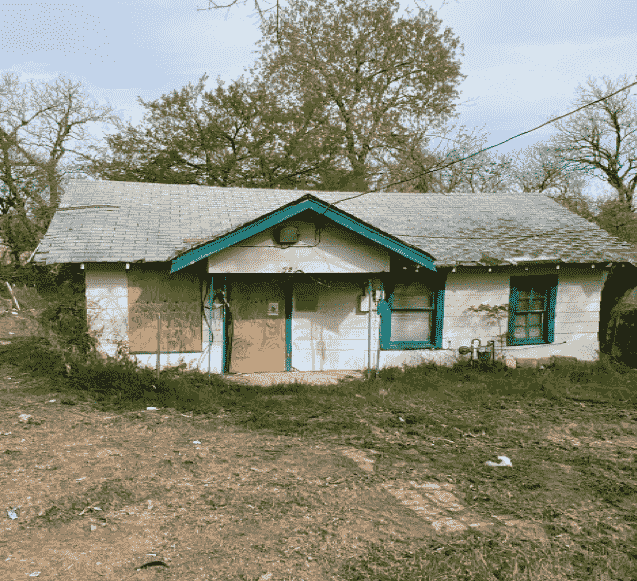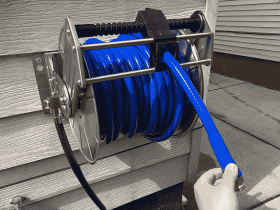Are you the owner of a heavily damaged house? Maybe you had a recent fire and now don’t know what to do with a burnout home? Or did a pipe burst and you are now trying to sell a water damaged property? Or maybe the city or county has just given notice that your old rental vacant property is now a condemned house?
Heavily damaged homes, sometimes considered uninhabitable eyesores, present a particularly tricky situation for sellers. Selling a fire-ravaged, water-damaged, or even condemned house in Texas isn’t a walk in the park. It demands a deep dive into the legal maze, understanding regulations, and getting a handle on the practicalities of such a sale.
This article is your roadmap to navigating the complexities of selling a damaged Texas home. We’ll uncover the different paths you can take, as well as the obstacles you might encounter along the way.
One of the primary concerns when selling a heavily damaged property is finding a buyer who is willing to invest in such a property. The renovation can be daunting, as the condition of the house may deter prospective retail buyers. However, with the right strategies and approach, it is possible to attract home buyers who specialize in purchasing and rehabilitating damaged properties.
This article will delve into the process of finding an appropriate buyer, exploring alternative options such as selling to companies that buy houses in any condition. Additionally, it will discuss the importance of rehabilitating and renovating the damaged house to maximize its value and appeal to potential buyers.
By providing valuable insights and guidance, this article aims to empower homeowners with the knowledge they need to navigate the complex process of selling a damaged house in Texas.

Understanding the Process of Selling a Damaged House
Trying to wrap your head around the red tape involved in selling a damaged house can be a real headache. The legal and administrative hoops you have to jump through can leave you feeling lost and frustrated. A damaged house is essentially a home that’s been labeled unsafe or unhealthy to live in.
To sell a damaged house, you’ll need to go through a rehab process to fix the problems that got it condemned or caused major damage. This means tackling any structural issues, faulty wiring, plumbing problems, and other things that need fixing.
Let’s be real, selling a house with a checkered past isn’t a piece of cake. Buyers might get cold feet when they hear about a history of major damage.
Getting a damaged house ready for sale means rolling up your sleeves and diving into renovations. You’ll need to pinpoint and fix anything that’s a safety hazard or health risk. That might mean calling in the pros – contractors, engineers, you name it – to check out the structure, wiring, plumbing, and anything else that needs work. Renovating a damaged house in Texas can be an expensive headache, both on your time and your wallet. But it’s the only way to whip the place into shape so buyers will want it.
Selling a house with a history of problems – like being condemned, catching fire, or dealing with mold – comes with its own set of hurdles. Buyers are understandably worried about the house’s current state and the potential costs down the line.
To put buyers’ minds at ease, you’ll likely need to lay out all the details of the renovation work, including any official certifications or inspections you’ve gotten. Transparency is key here.
You’ll also have to factor in the cost of fixing up the place and the fact that some buyers might be hesitant due to the risks involved. This means you might have to adjust your asking price a bit.
To sum it up, selling a damaged house is all about knowing the ins and outs of the renovation process and being able to talk to buyers in a way that addresses their worries head-on.
Now that we’ve covered the basics, let’s move on to the next hurdle: finding someone willing to take this project off your hands. There are some tricks of the trade that can make the process a bit smoother.
Finding a Buyer for Your Damaged Property
To attract the right buyer for your fixer upper property, you’ll need a savvy marketing plan that speaks directly to those who see potential in distressed property deals.
Teaming up with a realtor who knows the ropes of selling damaged homes is a smart move. They’ve got the know-how to get your house in front of the right eyes and help you set a fair price, given its current state.
Haggling over the price is just part of the game when selling a fixer-upper. Since the house has seen better days, buyers will likely try to get a bargain. Be upfront about its condition, and set a realistic price from the get-go. Working with a skilled realtor can help you navigate this negotiation process and ensure that you find a buyer who is willing to pay a reasonable price for your damaged house.
Score! You’ve found a buyer and agreed on a price. Now comes the fun part (or not): deciding whether to take on the massive task of fixing up the house yourself.
Renovating a Heavily Damaged House
Fixing up a seriously damaged house can feel like a miracle in the making. You’re taking something abandoned and broken and turning it back into a cozy, beautiful home.
But let’s be honest, this kind of project isn’t for the faint of heart. One of the main obstacles faced when rehabilitating a damaged house is the extensive repairs and renovations that are often required. From fixing structural issues to updating electrical and plumbing systems, the remodeling process can be time-consuming and costly.
Additionally, finding the right contractors and skilled laborers who specialize in working on damaged properties can be a daunting task. Despite these challenges, the result of a beautifully restored home can be incredibly rewarding.
The financing options available for rehabilitating a damaged house can vary depending on the individual’s financial situation and the extent of the renovations needed. Traditional lending institutions may be hesitant to provide loans for damaged properties due to the higher risks involved.
However, there are alternative financing options available such as hard money loans or rehab loans specifically designed for property rehabilitation projects. These loans often come with higher interest rates and stricter terms, but they can provide the necessary funds to undertake the renovations.
Additionally, there are government programs and grants available that can assist homeowners in financing the rehabilitation of damaged properties.
Rehabilitating and renovating a damaged house can be a challenging yet rewarding endeavor. The process requires addressing multiple rehabilitation challenges such as extensive repairs and finding skilled laborers. However, with the right financing options and determination, it is possible to transform a damaged property into a beautiful and habitable home once again.
In the next section, we will explore the option of selling the property to a company that buys houses in any condition, providing an alternative solution for homeowners who may not have the resources or desire to undertake the rehabilitation process themselves.
Selling to a Company that Buys Houses in Any Condition
One option for homeowners facing damaged property is to explore the possibility of selling it to a trustworthy company that specializes in purchasing houses in any condition. These companies offer a convenient and hassle-free solution for homeowners who are unable or unwilling to rehabilitate the property themselves.
By selling to a company that buys houses in any condition, homeowners can avoid the lengthy and costly process of renovating a damaged house and instead receive a cash offer for their property.
The selling process to a company that buys houses in any condition is typically straightforward and efficient. Homeowners can start by contacting these companies and providing them with relevant information about the property. This may include details about the property’s condition, location, and any outstanding debts or liens.
Based on this information, the company will assess the property and make a cash offer. If the homeowner accepts the offer, the company will handle all the necessary paperwork and closing procedures, making the selling process quick and hassle-free.
By selling to a company that buys houses in any condition, homeowners can also benefit from receiving a cash offer. This can be particularly advantageous for those who need to sell their damaged house quickly or who are facing financial difficulties. A cash offer provides homeowners with immediate funds, allowing them to move on from their damaged property and explore alternative options for selling it.
Whether they choose to invest the cash in a new property or use it to pay off debts, homeowners can have peace of mind knowing that they have received a fair and competitive offer for their damaged house.
Selling a damaged house to a company that buys houses in any condition offers homeowners a convenient and efficient solution. The selling process is straightforward, and homeowners can expect to receive a cash offer for their property.
By exploring this option, homeowners can avoid the time-consuming and expensive process of rehabilitating a damaged house.
In the next section, we will explore alternative options for selling a damaged house, providing homeowners with a comprehensive understanding of their choices.
Exploring Alternative Options for Selling Your Damaged House
Exploring alternative options for selling a damaged property can provide homeowners with a range of possibilities to consider. When faced with the prospect of selling a damaged house in Texas, homeowners may feel limited in their choices. However, there are several selling options available that can help alleviate the financial implications of owning a damaged property.
Another alternative option for selling a damaged house is to list it on the traditional real estate market. This option may require homeowners to invest in repairs and renovations upfront to make the property marketable. While this can be a costly endeavor, it may result in a higher sale price and attract potential buyers who are willing to take on the project. However, navigating the legal and regulatory requirements associated with selling a damaged property can be complex.
Homeowners must ensure that they comply with all local laws and regulations, including obtaining the necessary permits and inspections.
Exploring alternative options for selling a damaged house in Texas can provide homeowners with a range of possibilities to consider. Whether selling to a real estate investor or listing on the traditional market, homeowners must carefully weigh the financial implications of each option. Additionally, navigating the legal and regulatory requirements is crucial to ensure a successful sale. By considering these factors, homeowners can make informed decisions and find the best solution for selling their damaged property.
Navigating the Legal and Regulatory Requirements
Navigating the legal and regulatory requirements when selling a property in poor and damaged condition can be a daunting and complex task, potentially adding additional stress and frustration to an already challenging situation. Understanding the legal implications involved in selling a damaged house is crucial to ensure a smooth and successful transaction.
It is important to be aware of any local laws or regulations that may apply, as well as any specific requirements for disclosing the property’s condition to potential buyers. Seeking professional guidance from a real estate attorney or a knowledgeable real estate agent can help navigate through this intricate process.
One of the main legal implications when selling a damaged house is the duty to disclose the property’s condition. In many jurisdictions, sellers are required to disclose any known defects or issues that may affect the property’s value or safety. This includes disclosing that the property has been damaged or is in poor condition. Failing to disclose this information can lead to legal repercussions and potential lawsuits from buyers who feel they were misled. Therefore, it is important to be transparent and upfront about the property’s condition to avoid any legal complications down the line.
To ensure a smooth sale, it is highly recommended to seek professional guidance when dealing with damaged property. A real estate attorney can provide valuable assistance in understanding the legal requirements and implications involved in selling a damaged house. They can help navigate through any local laws or regulations that may apply and ensure that all necessary disclosures are made to potential buyers.
Additionally, a knowledgeable real estate agent who specializes in distressed properties can provide guidance on pricing, marketing, and negotiating the sale. Their expertise can help maximize the value of your damaged property and attract potential buyers who are willing to take on the necessary repairs or renovations. And if all else fails, why not try using the power of prayer to sell a house quickly?
In the subsequent section about maximizing the value of your damaged property, it is important to explore strategies and tips for presenting the property in the best light and attracting potential buyers. By highlighting the property’s potential and emphasizing its unique features, sellers can increase the perceived value and generate interest from buyers who are willing to invest in its rehabilitation.
Maximizing the Value of Your Damaged Property
Maximizing the value of a property in poor condition requires strategic presentation and emphasis on its potential, as research shows that well-staged homes can sell for significantly more than unstaged homes.
When renovating a damaged house in Texas, it is important to consider various strategies that can enhance its appeal to potential buyers. One effective approach is to focus on the property’s unique features and highlight any opportunities for customization. By showcasing the property’s potential, buyers can envision the possibilities and be more willing to invest in the property.
Another crucial aspect to consider when maximizing the value of a damaged house is pricing. It is essential to carefully assess the market and set a competitive price that reflects the property’s condition. Overpricing the house may deter potential buyers, while underpricing may result in financial loss. Conducting a thorough analysis of the Texas real estate market, including comparable sales and current demand, can help determine the optimal price range for the property. Prices to sell a house in Arlington TX will defer than home sale prices in Plano or Dallas, Texas. Additionally, considering the renovation costs and time required for the home improvements can also influence the listing price strategy.
In addition to the renovation strategy and pricing considerations, it is important to leverage various marketing techniques to attract potential buyers. Utilizing high-quality photographs, virtual tours, and detailed property descriptions can significantly enhance the property’s online presence and generate more interest. Engaging with local real estate agents who specialize in selling distressed properties can also be advantageous, as they possess the necessary expertise and connections to reach potential buyers who are specifically interested in purchasing damaged houses.
By employing these strategies, sellers can maximize the value of their damaged property and increase the likelihood of a successful and quick home sale.











Leave a Review